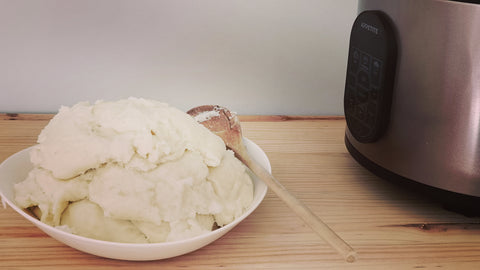
The Challenges of Making Pap for Experienced Cooks - Why You Need a Pap Maker
Pap, also known as porridge and mielie pap, is a popular dish made from ground maize or other grains. It's a staple food in many African countries and is typically prepared by mixing the grain with water to form a thick paste, which is then cooked over a low heat. Depending on the region and culture, the consistency of the paste varies.
Even for the experienced cook, cooking pap is not without its challenges. Here are some of the main difficulties an experienced cook will encounter while cooking pap:
- Tediousness: Making pap can be a repetitive and time-consuming process, particularly if you have to stir the mixture continuously to prevent lumps from forming. Some people may find this tedious and tiresome, especially if they are making a large batch of pap.
- Inconsistency: Achieving the right consistency of pap can be tricky, especially if you are not used to making it. The mixture can easily become too thick or too runny, and getting it just right can take some practice. Some people may become frustrated by the inconsistency of their pap.
- Messiness: Mixing pap can be a messy process, with flour flying around and spills occurring. Cleaning up afterwards can also be time-consuming and tedious, especially if the mixture has dried and hardened.
- Cleaning: Pap can be very sticky. It normally forms a thick crust on the inside of the cooking vessel, which can make it difficult to clean cooking vessel and utensils used to make it. The traditional method of cleaning involves soaping the cooking vessel overnight and scrubbing the inner surface to remove the crust.
- Cultural differences: For those who did not grow up eating pap, the idea of making it or even eating it may be unfamiliar or unappealing. Cultural differences can play a role in shaping people's attitudes towards different foods and cooking methods.
- Burning: Depending on the amount of water, maize meal and the cooking surface of the cooking vessel, the pap can burn easily, leaving a burnt taste and an unpleasant smell. Even for the experienced cook, it is tricky to consistently achieve the right results.
- Time-consuming: Making pap can be a time-consuming process, as it requires constant stirring and monitoring to prevent lumps and burning.
- Safety: During the cooking process, the cook, even an experienced one, is subjected to the risks of burnt.
The Appetite Automatic pap maker will automate the process of making pap. Instead of having to mix the grain and water by hand and continuously stir it to prevent lumps from forming, the Appetite automatic pap maker can mix the ingredients and cook the pap for you. This can save time and effort in the kitchen, especially for people who make pap frequently or in large quantities.
Additionally, the Appetite automatic pap maker has smart cooking features that automatically sets the cooking time and temperature, which can help ensure that your pap is cooked to your desired consistency.
Overall, the Appetite Automatic Pap Maker has the following benefits over cooking with the traditional method:
- Convenience: The Appetite automatic pap maker can save time and effort compared to making pap manually. The machine can mix and cook the pap without the need for constant attention or stirring.
- Cleaning: With the self-cleaning function, the appetite automatic pap maker automates the cleaning process after coking pap.
- Consistency: With an automatic pap maker, you can ensure that your pap is cooked to the same consistency every time, which can be difficult to achieve when making it manually.
- Precision: With our smart cooking system, The Appetite automatic Pap Maker automatically sets the cooking temperature and stirring speed which can help ensure that your pap is cooked to your desired consistency.
- Safety: The Appetite automatic pap maker eliminates the risk of burns and other injuries that can occur when cooking pap on a stove.
In addition, the Appetite Automatic Pap Maker Deluxe is also Multi Cooker (multi Cooker) — Soup/Broth, Meat/Stew, Bean/Grain, Egg, Sous Vide, Slow Cook, Rice, Porridge/Oatmeal, Steam, Sterilize, and Keep Warm. Find out more about the multi cooker in this blog post: what is a multi cooker - a comprehensive guide

Comments (0)
There are no comments for this article. Be the first one to leave a message!